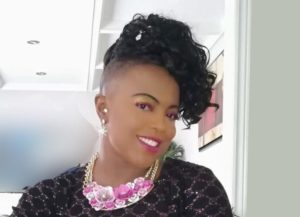Juliet Opoku named 2018 BBDC Diabetes Educator of the Year

February 21, 2019
“Above and beyond” – it’s the name of the recognition program award which Juliet Opoku earned a whopping five times during a tenure at Windsor Regional Hospital earlier in her career, based on recognition from patients and their families of practitioners who go beyond their duties to improve hospital stays. But there’s also no truer description of Juliet’s overarching approach to patient care than those three words.
Winner of the Banting and Best Diabetes Centre Educator of the Year Award for 2018, Juliet sees her role as going far beyond standard care metrics, connecting patients most likely to be underserved by the healthcare system with resources to improve not only diabetes outcomes but their whole lives – whether that means free insulin testing strips or a referral for legal aid to deal with immigration issues.
As a registered nurse and diabetes educator at Unison Health and Community Services in Toronto, Juliet works within some of the city’s most impoverished communities to provide counselling for type 2 diabetics and their families. Having arrived in Canada at age 13 as an immigrant from Ghana, Juliet sees herself and her family in her clients’ struggles to get past barriers such as language and immigration status to obtain quality diabetes care.
“Being an immigrant myself and having relocated to a new place where I didn’t know the language very well, we didn’t know a lot of people, I know how health can deteriorate,” Juliet says. “We lived in social housing and had to go to food banks and wear second-hand clothes. I know how little you feel and how unimportant you feel.”
To Juliet, who first became interested in diabetes while working within indigenous communities, caring for vulnerable populations means going beyond basics such as blood sugar monitoring, diet and nutrition, to discuss other areas of her clients’ lives that may be affecting their health. “Diabetes health is affected by everything,” she says. “Stress affects blood sugar, what we’re eating – everything affects blood sugar and can lead to complications if it’s not managed well. But for these clients, unless you dive into their backgrounds, it’s hard to know what’s really happening.
“As you build a rapport with clients, as they become more comfortable, they start to relay what’s really happening,” Juliet says. For one client, peeling back the layers revealed the woman was sleeping on a makeshift bed made of phonebooks, which was taking an added toll on her health. Juliet had an extra mattress at home and arranged to have it delivered to the client’s house. “Juliet changed my life,” that client wrote in a letter supporting the nurse’s application for Diabetes Educator of the Year. “She works tirelessly … to help improve the lives of her clients living with diabetes. She never let(s) you leave her office without … reminding you that you are important, that you matter, that she cares and things will get better.”
But Juliet’s dedication to going above and beyond encompasses more than individual patients – she’s made it a mission to play a role in improving diabetes care across the board, participating in the Toronto Central Local Health Integration Network’s Insulin Standards Working Group to review programs across the country and develop best practices for insulin training programs. As a member of Unison’s diabetes education centre quality improvement committee, she plays a key role in initiatives such as chart audits – including developing internal guidelines and processes – developing resources for the foot care clinic and insulin training, and establishing client surveys to identify areas where clients’ needs may be underserved. Among her ongoing volunteer activities, she helps to source supplies such as insulin pen needles for children with type 1 diabetes who come from Portuguese immigrant families that are not eligible for OHIP. “Without these initiatives, these clients wouldn’t have any way to manage their disease,” she says.
Often this means working well beyond her Monday to Friday shifts at Unison, applying for supplies and speaking in the community to promote awareness about diabetes and public health resources. “It was part of my upbringing to give back,” Juliet says. “Growing up in Ghana, my grandmother and my mother were very charity oriented. They taught me that you always have something to give back, you can always help somebody.”
As Diabetes Educator of the Year, Juliet says she hopes she inspires her own four children – who range in age from six to eleven – and nieces and nephews to find their own way to do the same. “At the end of the day, we’re all trying to survive”. If someone needs a helping hand, you help them. Never think you’re better or above anyone. We’re all people. Be a blessing to everyone whom you come across. Be a human in everything you do.”
